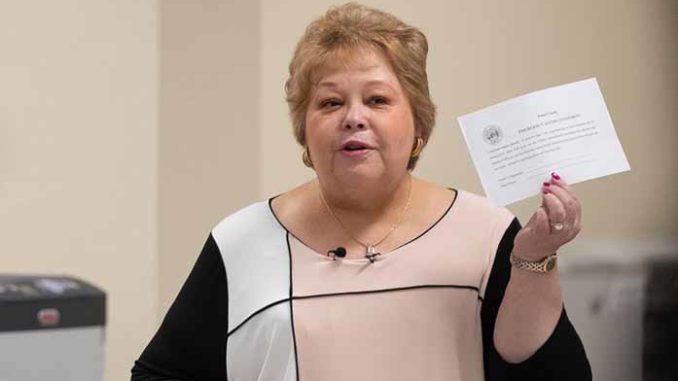
The month leading up to a general election is referred by many as silly season, but like everything in 2020 it seems sillier this year. Or perhaps more frustrating, if you are a government official responsible for ensuring a smooth election process.
One of those officials is Cochise County Recorder David W. Stevens, who was first elected to the position in 2017. Stevens is used to political gamesmanship, having served as an Arizona State Representative from 2009 through 2017.
But the weeks leading up to the Nov. 3 general election have been anything but funny for Stevens and the other 14 elected county recorders across Arizona.
First, all of the recorders’ timelines were upended when a federal court of appeals extended the state’s Oct. 5 statutory voter registration deadline to Oct. 15, a decision supported by Secretary of State Katie Hobbs without any direct input from the recorders themselves just as early balloting began Oct. 7.
“Running an election is challenging enough we don’t need more challenges from the Secretary of State and federal courts making decisions without our input and changing long standing state law,” he said. “Is it really that hard to communicate with us as these decisions do impact how we do our job?”
Last week Pima County Recorder F. Anne Rodriguez was ordered to testify in court about whether a judge could order her to set up a polling center for the Pascua Yaqui Tribe even though less than 50 voters used the last polling center.
Rodriguez, who has been involved with more than 300 elections in her time with Pima County, is seen as a mentor by many of the other recorders. She won the polling center challenge despite last minute maneuvering from Hobbs’ staff but it kept her away from her other duties at a critical time in the election process.
Stevens calls the lack of communication from Hobbs’ office “stark” and insists his concerns are not partisan.
“I came into the Recorders job in 2017 signing a letter from all 15 recorders to the last secretary of state, seeking better communications so we can stop these problems,” he explains. “Looks like the Recorders need to sign another letter!”
Other elections battles have taken place in state and federal courtrooms, including one over whether Maricopa County’s recorder can allow ballots to be cast via social media apps by voters who cannot engage in mail-in or in-person voting. And several members of the Navajo Nation unsuccessfully sued to have their mail-in ballots accepted a few days late if postmarked on or before Nov. 3.
Stevens has already spent a lot of time attending court proceedings this election season as Cochise County had four candidate challenges filed. He knows the legal fights are likely not over.
For instance, the extension of the voter registration deadline was challenged by two Republican committees which argued the courts had no authority to invalidate Arizona’s statutory deadline, which for the last 30 years has set the deadline at 29 days prior to the general election. They could still challenge ballots cast by voters who registered between Oct. 6 and Oct. 15.
That issue is something Stevens will deal with when necessary, he says, but until then he and his five-member staff are concentrating on the here and now. Which includes a lot more ballots already being turned in than expected.
According to Stevens, his office is seeing a high number of in-person early voting in Cochise County, with nearly 170 votes cast on Oct. 22. That brings the total in-person early voting to nearly 2,000 since Oct. 7.
In addition, more than 33,000 of the 58,000 ballots mailed out to Cochise County voters have been turned in as of Oct. 22, either by mail, returned in person to the recorder’s office in Bisbee, or placed in official drop-boxes across the county.
And then there’s the early ballots being returned via drop boxes across Cochise County. One of the boxes is at Stevens’ office in Bisbee, but he is also responsible for removing the enveloped ballots from the county’s five official remote drop-boxes across the 6,200-squre mile county.
For those unfamiliar with the size of Cochise County, the states of Delaware and Rhode Island are 2,489 and 1,212 square miles, respectively.
Stevens says two staff members must be present when the envelopes are removed from the boxes and transported back to Bisbee. And to make it even more logistically difficult, the two people must belong to different political parties or registered as independents.
Of course Stevens is always keeping an eye on election litigation across the state. Last week a Maricopa County judge denied a public record request by the Arizona Democratic Party that would have forced Recorder Adrian Fontes to immediately release updated lists of returned ballot envelopes which the recorder’s office identified as having some type of issue.
Fontes argued that the process could lead to several updated internal lists during a day, making if burdensome to release lists in real-time. A Maricopa County judge agreed that the public is only entitled to such records “promptly,” not immediately. A similar lawsuit is pending against Rodriquez in Pima County.
Stevens hasn’t started creating lists of Cochise County’s problem envelopes, but says he will soon, and wouldn’t be surprised if his office faces a similar request that will further challenge his already very busy staff. But whether it’s that issue or something else, Stevens says he expects more lawsuits “as we near election day and the days preceding the election.”
This time he just hopes Hobbs has learned her lesson about keeping the state’s county recorders in the loop.
